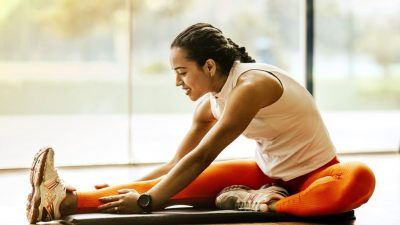8 Ways to Improve Athletic Recovery with Food

When we exercise we cause natural inflammation and oxidative stress in our body. It’s our body’s way of coping with and adapting to the increased physical workload. Most of us have experienced delayed-onset muscle soreness (DOMS) after an arduous hike, an intense yoga session or a long Sunday morning run. As long as we rest and recover sufficiently, the inflammation will subside, the micro-tears in our muscles will repair and we will reap the gains of our activity. Part of that recovery includes making sure we are feeding our body everything it needs, and avoiding the things it doesn’t. Here are eight ways we can use our diet to ensure we get the most out of each session and are ready for the next.
1. Eat the rainbow
Exercise creates a spike in oxidative stress. We therefore want to consume foods rich in antioxidants to neutralise it. The phytonutrients in colourful vegetables, such as carotenoids in peppers, broccoli, sweet potatoes, kale and spinach, act as antioxidants, helping us recover from physical activity. A 2015 study found that “spinach has alleviating effects on known markers of oxidative stress and muscle damage following a half-marathon in well trained healthy young men.”
Persistent, extreme exercise, like ultra-marathon running, can put a lot of strain on the body and can actually have weakening effects on the immune system. It’s therefore really important to eat foods which support a healthy immune system, like foods rich in vitamin C and zinc.
2. Chow down on cherries and berries
Tart cherry juice has been shown to significantly reduce the amount of muscle soreness after intense exercise. The authors of a 2016 study concluded that this was due to the high concentration of polyphenols.
The same can be said for blueberries. A 2018 study demonstrated that blueberries not only improved recovery time but improved athletic performance after their consumption. The authors stated that the findings were “consistent with many previous studies showing that supplementation of blueberry can increase antioxidant levels but decrease inflammation levels.”
3. Turn to turmeric and ginger
It’s not only fruit and vegetables that offer these benefits – some spices do too.
We’ve all heard of the powerful anti-inflammatory effects of turmeric. The superhero compound in turmeric is called curcumin – a very strong antioxidant with anti-inflammatory properties. Its antioxidant capacity means it goes around disabling those pesky free radicals that can damage your cells, DNA, enzymes, fatty acids and lead to disease. On top of being a powerful antioxidant, curcumin also stimulates your body’s own defences and antioxidant compounds, making them more effective.
If turmeric had a superhero sidekick it would be ginger. A 2015 study concluded that “4 g of ginger supplementation may be used to accelerate recovery of muscle strength following intense exercise,” and a systematic review of ginger’s effects on athletic recovery concluded that, although more research is needed, “ginger taken over 1-2 weeks may reduce pain from eccentric resistance exercise and prolonged running.”
4. Go nuts
Increasing our nut consumption has many health benefits, including lower risk of heart disease and type 2 diabetes but nuts have also been shown to reduce inflammatory biomarkers in the body. A 2016 study analysed data from over five thousand people and found that an increased intake of nuts was associated with lower levels of inflammation, likely due to nuts being rich in unsaturated fats. The authors recommended “substituting nuts for red and processed meat, eggs, refined grains, potatoes, or potato chips.”
5. Splash out on virgin olive oil
Virgin olive oil (made cold-pressed and without the use of any heat or chemicals) contains a compound called oleocanthal, which has anti-inflammatory properties akin to ibuprofen.
Since its discovery, oleocanthal “has been reported to exhibit various modes of action in reducing inflammatory related disease, including joint-degenerative disease, neuro-degenerative disease and specific cancers.” With such a strong track record, it wouldn’t be surprising if these anti-inflammatory effects would benefit athletes as well. And indeed, a 2021 study suggested that virgin olive oil “could reduce the inflammatory impact of intense aerobic effort and improve recovery.”
6. Optimise omega-3s
Omega-3 fats are a type of unsaturated fat naturally found in walnuts, flaxseeds and chia seeds and their oils, and algae (and fish because they eat the algae). They are considered an essential nutrient because our body is incapable of making them and so they must be obtained from food.
Omega-3 fats have been shown to inhibit chronic inflammation for a variety of serious health conditions, and more recently they have been put to the test in an athletic arena. A 2020 review in Nutrients, found “studies suggest a potentially beneficial effect of EPA/DHA on performance by improved endurance capacity and delayed onset of muscle soreness, as well as on markers related to enhanced recovery and immune modulation” and they “identified evidence to support a role of EPA/DHA in improved performance such as enhanced endurance, markers of functional response to exercise, enhanced recovery or neuroprotection.”
7. Swap animal-based protein for plant-based protein
Protein is a vital part our diet, but especially if you’re very active. Without it our muscles would wither and we would become frail, they would be unable to repair and grow after exercise. Processed and red meat, although high in protein, have been shown to increase inflammation in women – the opposite of what we want for athletic recovery. A 2020 study found that “plant protein was associated with a lower risk of all cause and cardiovascular disease mortality” and that by replacing animal protein with plant protein we could live longer.
What’s more, according to a 2019 review, “compared with omnivores, people following vegan and vegetarian diets have increased antioxidant activity, due to higher intakes of vitamin C, vitamin E, beta-carotene, and other antioxidants” and “a plant-based diet appears to be a helpful part of a strategy to reduce inflammation.”
According to Neal Barnard MD, “Meat consumption and high cholesterol levels exacerbate inflammation, which can result in pain and impair athletic performance and recovery.” So, instead of looking to animal sources of protein, swap your whey powder for pea protein and switch out beef burgers and sausages for tofu, tempeh and plant-based alternatives.
8. Avoid ultra-processed food and drink
Perhaps you have a hard session at the gym or endured a long Sunday morning run and then feel like indulging in a large plate of junk food and a few pints in the pub because you’ve earned it. Although this might feel like a well-earned treat, it’s unfortunately self-sabotage as most of these foods cause inflammation (and other negative health outcomes) and therefore hinders recovery. A 2021 study found that the consumption of ultra-processed foods was linked to an increased risk of inflammatory bowel disease and several other studies show an increased risk of heart disease and death.
If you’re working hard to maintain your health by exercising regularly, don’t do yourself a disservice with a poor diet. Of course, the odd ‘cheat meal’ won’t hurt but make sure it remains the exception and not the rule.
It might feel like all the benefits from exercise come from the time we spend at the gym or running out on the trails, but the truth is most of the benefits come in the time between the last exercise and the next. That’s when our muscles are repairing and our body is becoming stronger. This is why it’s vitally important to take rest and recovery as seriously as the actual workout. But if you follow these guidelines, you can rest assured your diet is going to be helping you recover optimally so you can bounce back stronger every time.







